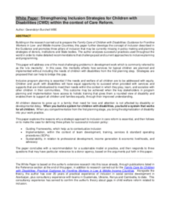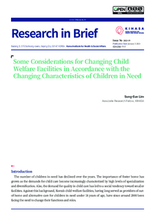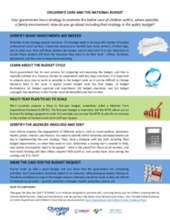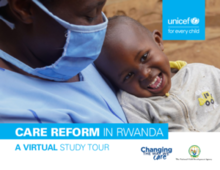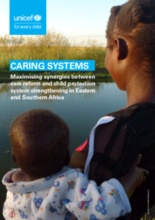Displaying 181 - 190 of 946
This paper will address one of the most challenging problems in development work which is commonly referred to as the ‘silo mentality’. In this case, this mentality affects how services for typical children are planned and implemented without including the needs of children with disabilities from the first planning step. Strategies are proposed that can help to bridge this gap.
UNICEF Bulgaria's project, "Family for Every Child," aimed to demonstrate that viable alternatives to institutionalization exist, and that as long as a network of suitable support services is in place, deinstitutionalization is achievable. UNICEF Bulgaria commissioned this evaluation to establish whether the project had been successful
This brief discusses ways in which the roles and functions of Korea’s child welfare facilities should change to better meet the diverse needs of children in need.
This guidance is designed to strengthen the capacity of government agencies in low resource settings to prepare a sound budgetary framework for policies, programs and services that aim to keep children in safe and nurturing family environments.
This one-page technical brief accompanies a Guidance Note on public expenditure and children's care. It describes how to include government strategy to promote the better care of children in the public budget.
Using a qualitative design, the author of this study interviewed 12 social workers to explore the benefits of family support services and challenges that inhibit the gains from the services.
This virtual study tour aims to provide you with a strong understanding of care reform in Rwanda
from the comfort of your own home.
This paper promotes a system strengthening approach to care reform. It begins with an explanation of child protection and care and the relationship between these two concepts. It goes on to explain why system strengthening is needed to improve children’s care, and how care reform can be carried out systematically, using a range of examples from across the Eastern and Southern Africa region. The paper is aimed at UNICEF country office staff, government and others working on children’s care and protection in the region.
The goals of Catholic Care for Children in Uganda (CCCU) are to enable children to grow up in safe environments, reduce recourse to institutional care, and encourage family- and community-based care for children. This midterm evaluation examines what has been accomplished in the four years since the program began.
Miracle Foundation's Child-Centered Case Management Toolkit provides hands-on training materials to help you get children safely and permanently into families. For an in-depth understanding of our case management tools and Thrive Scale™ contact safelyhome@miraclefoundation.org.

